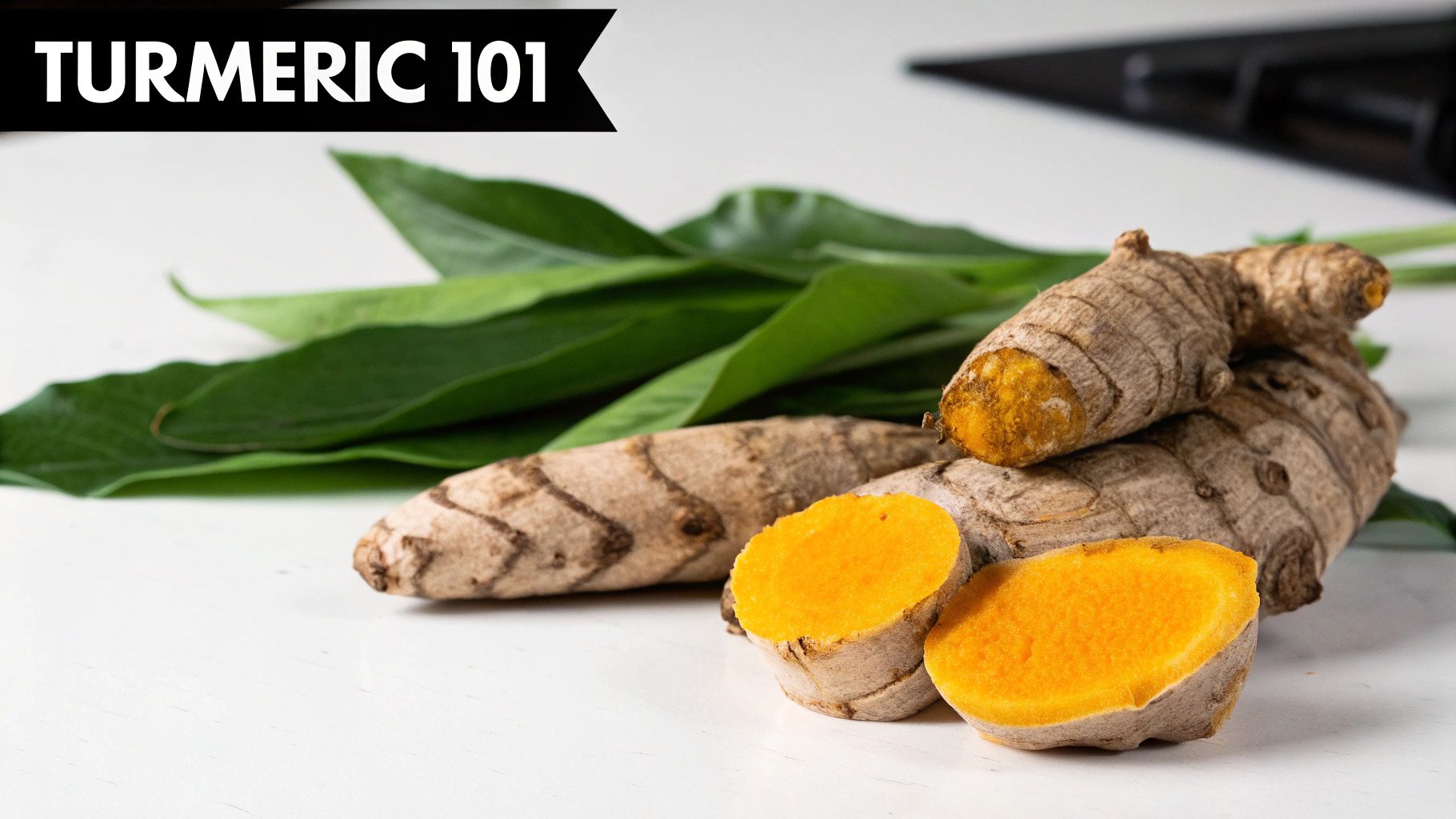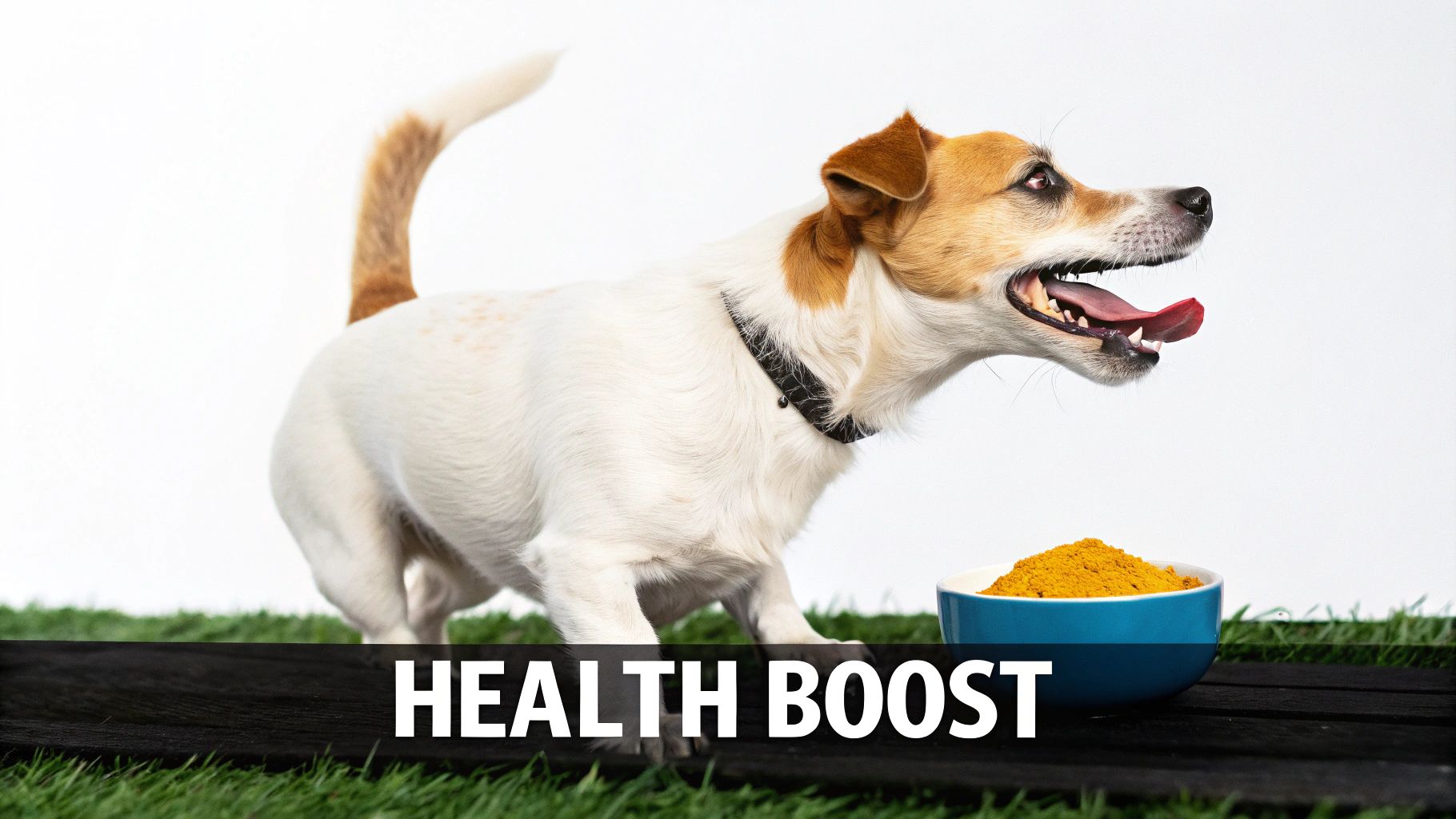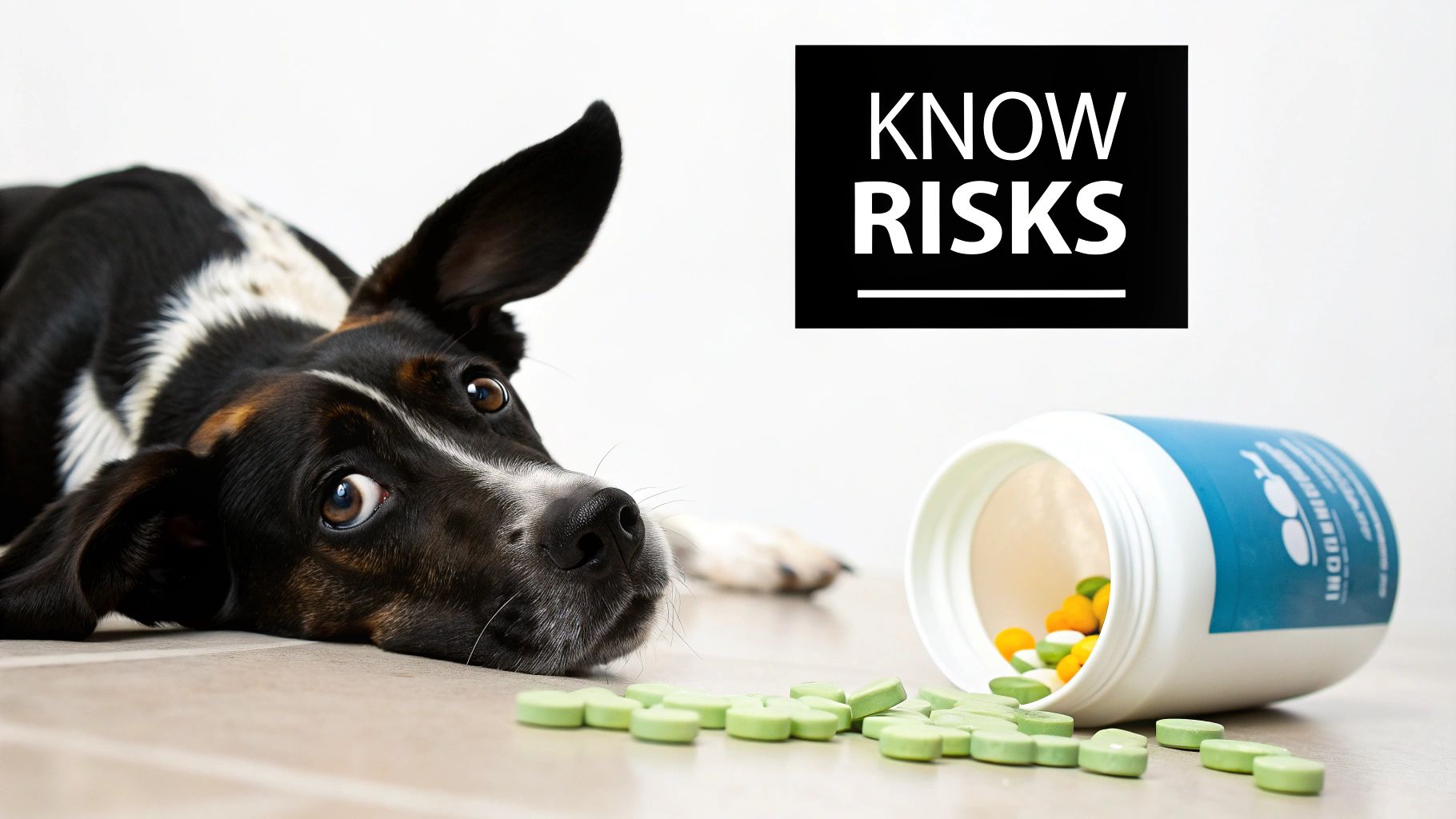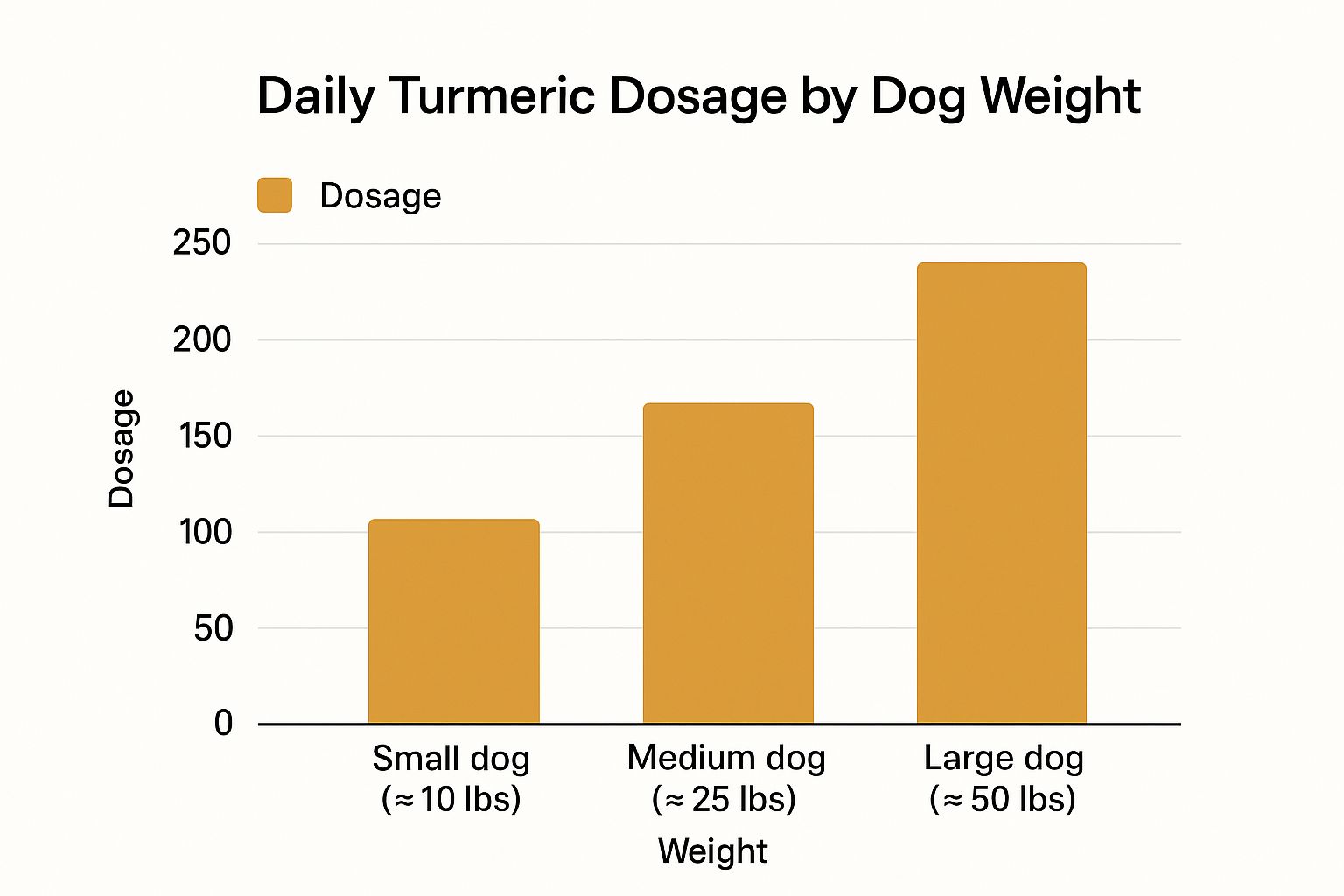
Is Turmeric Good for Dogs? Benefits & Safe Use Tips
So, you're wondering if you can give your dog turmeric. The short answer is yes, but it's not quite as simple as sprinkling some from your spice rack onto their food. The real magic of this golden spice lies in a compound called curcumin, which is a powerhouse anti-inflammatory and antioxidant. Given correctly, it can be a fantastic natural supplement for your dog.
The Verdict on Turmeric for Your Dog

It seems like everyone is looking for natural ways to boost their dog's health these days, and turmeric always pops up in the conversation. It’s praised for its ability to ease achy joints, calm down itchy skin, and just generally support a dog's vitality. But here's the catch: you have to be smart about it.
The key to using turmeric safely and effectively comes down to two things: the formulation and the dosage. On its own, the curcumin in turmeric is actually pretty difficult for a dog's body to absorb. Think of it like a key that can't quite fit the lock. That’s why you’ll almost always find it paired with other ingredients that boost its bioavailability—a fancy term for how much of a substance actually gets into the bloodstream to do its job.
Benefits vs. Risks at a Glance
To give you a quick overview, let's break down the main pros and cons. A high-quality turmeric supplement can be a game-changer for many dogs, but it's crucial to understand that it isn't the right fit for every pup.
Here is a quick summary of what to keep in mind.
Turmeric for Dogs at a Glance
| Benefit or Risk | Explanation |
|---|---|
| ✅ Benefit | Its natural anti-inflammatory power can help ease the joint pain and stiffness that comes with arthritis. |
| ❌ Risk | It can cause an upset stomach or other digestive issues, especially if the dose is too high or started too suddenly. |
| ✅ Benefit | The strong antioxidant effects help shield your dog's cells from damage and support a robust immune system. |
| ❌ Risk | Turmeric can interact with some medications (like blood thinners) and isn't suitable for dogs with certain health issues. |
Ultimately, while the benefits are compelling, they have to be weighed against the potential risks and your dog's individual health profile.
What the Research Shows
The good news is that this isn't all just hearsay; scientists are taking a serious look at curcumin for our canine friends. For instance, one study observed that dogs given snacks containing about 30 mg of curcumin every day started showing positive changes in just 15 days. Not only did their red blood cell markers improve, but they also had lower levels of inflammatory signals in their blood. If you're interested in the details, you can read the full research about these curcumin findings.
This kind of research shows that when used thoughtfully, turmeric is far more than just a yellow spice. It’s a functional food that can make a real difference in your dog's health.
Understanding Curcumin: The Power Behind Turmeric

To really get why so many dog owners are turning to turmeric, we need to look past the spice rack and zoom in on its active compound: curcumin. You can think of turmeric as the whole toolbox, but curcumin is the specific, high-powered tool that gets the most important jobs done.
It's this natural compound that gives turmeric its brilliant golden hue and, more importantly, packs all the health-boosting punch. While turmeric contains a family of compounds called curcuminoids, curcumin is the one that has been studied the most and is considered the most powerful.
Here's the catch, though. The regular turmeric powder in your kitchen is surprisingly low in this key ingredient, usually containing only 2-5% curcumin by weight. That's why just sprinkling a bit on your dog's dinner probably won't produce the results you're hoping for. For your dog to get a truly effective dose, you’ll need a more concentrated form, which is where good supplements come in.
How Curcumin Works in Your Dog's Body
So, what exactly happens when curcumin gets into your dog’s system? Its reputation is built on two major actions that work hand-in-hand to support your dog's overall health.
- A Natural Anti-Inflammatory: We know that chronic inflammation is at the root of many common dog ailments, from the achy joints of a senior dog to itchy, irritated skin. Curcumin steps in by gently interrupting the biological signals that kickstart that inflammatory response. It’s a natural way to help cool things down from the inside out.
- A Potent Antioxidant: Every day, your dog’s body is under attack from unstable molecules called free radicals. These are byproducts of normal metabolism, but they can damage cells and contribute to aging and disease. Curcumin acts like a bodyguard, neutralizing these harmful free radicals and protecting your dog's cells from what we call oxidative stress.
The Bioavailability Challenge
Now for the most important part of this whole discussion. For all its amazing benefits, curcumin has one major hurdle: very poor bioavailability. On its own, your dog’s body has a tough time absorbing it. Most of it would just pass right through their digestive system without ever getting into the bloodstream to do its job.
If you take away just one thing, let it be this: without tackling the bioavailability problem, even the best curcumin is basically useless. It's like having a high-performance race car with an empty gas tank.
Thankfully, there’s a well-known fix. Curcumin just needs a couple of key partners to unlock its full potential.
- A Healthy Fat: Curcumin is fat-soluble, which means it dissolves in fat, not water. When you pair it with a healthy fat source like coconut oil, it helps the curcumin pass through the intestinal wall and get absorbed properly.
- Black Pepper (Piperine): This is the real game-changer. Black pepper contains a compound called piperine, which dramatically boosts absorption. Piperine essentially tells the liver to slow down its processing of curcumin, allowing it to stay in the bloodstream longer and at much higher levels. In fact, studies show piperine can increase curcumin absorption by an incredible 2,000%.
Understanding this partnership is everything. Any effective turmeric supplement or homemade "golden paste" recipe will always include a fat and piperine. This simple combination ensures your dog isn't just eating curcumin—they're actually absorbing it and putting it to work.
What Can Turmeric Actually Do for Your Dog?

So, we've covered the science behind curcumin, but what does that mean for your dog? Let's talk about the real-world improvements you might actually see. The number one reason people turn to turmeric is for joint support, and it’s a well-deserved reputation. For dogs dealing with the stiffness and aches that come with arthritis or simply old age, it can be a game-changer.
By helping to cool down inflammation, curcumin can soothe those sore joints. The result? Better mobility and a dog that’s more willing to play. There's nothing quite like seeing an older pup who used to struggle with the stairs suddenly start moving with a bit more spring in their step.
While supplements are a great option, specially formulated treats can also offer joint support. If you're looking for more ways to help your furry friend, check out our guide to the best dog treats for arthritis.
It's Not Just About Joints
The benefits of turmeric don't stop with creaky hips. Because inflammation is at the root of so many issues, turmeric's soothing properties can have a positive ripple effect throughout your dog's entire body.
-
Calmer Skin & Fewer Allergies: Is your dog constantly scratching? Chronic inflammation is often the hidden cause behind itchy skin and painful hot spots. Turmeric can help dial down that internal irritation, which could mean less misery for both of you.
-
A Happier Tummy: This golden spice can be great for digestion, too. It's known to support a healthy gut lining and can help calm digestive upset, leading to more predictable and comfortable bathroom breaks.
It’s amazing how versatile one simple spice can be.
"Veterinary studies and clinical experience indicate that turmeric, rich in curcumin, acts as a natural anti-inflammatory and antioxidant. It is often recommended for dogs over seven years old, the age range when many dogs begin to experience mobility issues."
Can Turmeric Help Prevent Problems?
Beyond helping with current issues, many dog owners use turmeric as a proactive part of their dog's wellness routine. This is where its powerful antioxidant properties really shine. Think of antioxidants as cellular bodyguards. They neutralize harmful free radicals, protecting your dog's cells from the daily damage that leads to aging and disease.
This protective effect is a big deal for a few key areas of your dog's health:
- A Stronger Immune System: A healthy immune system is your dog's best defense. Turmeric helps keep it balanced, so it's ready to fight off illness without going into overdrive.
- A Sharper Mind: New research is exploring how reducing inflammation in the brain might help protect against the cognitive fog that can affect senior dogs. This could help keep your old friend mentally engaged for longer.
- Support During Cancer: It’s important to be clear: turmeric is not a cure for cancer. However, it's being heavily studied for its potential role in supporting dogs with the disease. By reducing inflammation and oxidative stress, it may help create an environment where cancer cells have a harder time growing, making it a promising complementary therapy.
When you understand these concrete benefits, it’s easier to see how the right turmeric supplement could be a fantastic, natural addition to your dog’s health plan, genuinely improving their quality of life.
Navigating the Potential Risks and Side Effects
While turmeric has some exciting potential, it's definitely not a magic bullet for every dog. Honestly, understanding the potential downsides is just as important as knowing the benefits. This is how you make a safe, informed choice for your furry friend.
The good news? Most side effects are pretty rare and usually happen when a well-meaning owner gives too much, too soon.
The most common complaint I hear is mild gastrointestinal upset. It’s a lot like introducing any rich new food into your dog's diet—their system might just need a little time to adjust. A dose that's too high can easily lead to diarrhea or an upset stomach. That’s why "start low and go slow" is the golden rule here.
It's also true that some dogs are just more sensitive. For instance, while turmeric's anti-inflammatory power can sometimes soothe skin issues, I've seen cases where it seems to make them worse. If your dog is dealing with ongoing skin problems, you might find some useful tips in our guide to the best dog food for skin allergies.
When Turmeric Should Be Avoided
For some dogs, turmeric is simply off the table, no matter the dose. It's absolutely critical to know if your dog falls into one of these categories before you even consider it.
Your dog should avoid turmeric if they have any of these conditions:
- Gallbladder Issues: Turmeric ramps up bile production. If your dog has a condition like a bile duct obstruction, this can make things much worse.
- A History of Kidney Stones: The supplement can increase urinary oxalate levels, which raises the risk of certain types of kidney stones forming.
- Bleeding Disorders: Turmeric is a natural blood-thinner. This is a serious risk for dogs that already have problems with blood clotting.
A quick pro tip: It’s always smart to stop giving your dog turmeric about two weeks before any scheduled surgery. This helps prevent any potential issues with blood clotting while they're under anesthesia.
Medication Interactions and Quality Concerns
Beyond specific health issues, you have to think about medications. Turmeric can interact with some very common prescriptions.
Because it can affect blood sugar and blood clotting, you must talk to your vet if your dog is on diabetes medication, blood thinners, or even common anti-inflammatories like NSAIDs. Don’t skip this step.
Finally, let's talk about quality. Not all turmeric is created equal, and the spice jar in your kitchen cabinet is not a good choice for your dog. It typically has very low levels of the active compound, curcumin, and can be contaminated with fillers or even heavy metals.
Always choose a high-quality product specifically formulated for pets. This is the only way to ensure purity and proper dosage, so you can be confident you’re actually helping your dog, not accidentally causing harm.
How to Safely Give Your Dog Turmeric
So, you're ready to see if this golden spice can help your dog. That's great! But before you start, it's really important to know how to do it safely and effectively. You've got a few different ways to go, from ready-made products to whipping up your own batch at home.
Let's break down the most common options:
- Commercial Chews and Treats: This is usually the simplest starting point. The doses are already measured out, and they're made to be tasty and easy for your dog's body to absorb. If you're looking into this route, it's worth checking out some of the healthiest treats for dogs to see how powerful ingredients can be baked right into their daily snacks.
- Turmeric Powders or Capsules: These give you more precise control over the amount, but you have to be careful with your measurements. You can't just sprinkle the powder on their food—it needs to be mixed with a healthy fat and some black pepper to actually work.
- Golden Paste: This is a very popular do-it-yourself method. It’s a simple paste made from turmeric powder, a fat like coconut oil, and black pepper. Once made, you can just scoop a bit into your dog's food bowl at mealtime.
Which one is right for you? It really comes down to your dog and your daily routine. If you have a picky pup, a yummy chew might be your best bet. If you prefer to have total control over what goes into your dog's body, making a fresh golden paste is a fantastic option.
Getting the Dose Right: Start Low and Go Slow
No matter which form you pick, the number one rule is to start low and go slow. This is non-negotiable. Giving their system time to get used to a new supplement is the best way to avoid an upset stomach or other issues.
Start with a very small amount each day. Watch your dog closely for a week or two to see how they respond. If all is well, you can then think about slowly increasing the amount.

As you can see, the right amount really depends on your dog's size. A tiny bit for a Chihuahua would be completely different than a dose for a Great Dane, which is why a one-size-fits-all approach just doesn't work here.
For those making their own golden paste, having a clear starting point is key.
General Starting Dosage Guide for Turmeric Golden Paste
This table offers an estimated daily starting dose for a homemade golden paste, based on your dog's weight. Remember, these are just starting points. It's always best to begin with a small amount and check with your vet.
| Dog's Weight | Suggested Starting Daily Amount |
|---|---|
| Up to 25 lbs | 1/4 teaspoon |
| 25 to 50 lbs | 1/2 teaspoon |
| 50 to 100 lbs | 3/4 to 1 teaspoon |
| Over 100 lbs | 1 to 2 teaspoons |
After a week or two at this initial dose, you can gradually increase it if needed, but always keep a close eye on your dog for any digestive changes.
Finding a Quality Supplement
If you decide to buy a commercial product, please don't just grab the first one you see. Quality makes all the difference. A low-quality supplement won't just be ineffective; it could potentially be harmful.
When you're shopping for a turmeric supplement, always ask for a Certificate of Analysis (COA) from a third-party lab. This is your proof—it tells you the product is pure, potent, and doesn't contain any nasty contaminants like heavy metals or pesticides.
By choosing a high-quality product and starting with a very careful, small dose, you can safely explore whether turmeric is a good fit for your best friend. And, of course, always have a quick chat with your veterinarian before adding any new supplement to their diet. They know your dog's health history and can give you the best advice.
Common Questions About Turmeric for Dogs
Even after you've weighed the benefits and risks, a few practical questions are probably still bouncing around in your head. That’s perfectly normal. When it comes to our dogs, we all want to get those last nagging details cleared up before we start something new.
Let's walk through the most common questions I hear from dog owners about turmeric. My goal here is to clear up any lingering confusion so you can feel confident in your decision.
Can I Just Use Turmeric From My Spice Rack?
This is, without a doubt, the question I get asked most often. And the answer is a firm no. It might seem like a simple shortcut to grab that jar from your kitchen cabinet, but it's a really bad idea for a couple of critical reasons.
First off, the ground turmeric you buy at the grocery store just isn't very potent. It usually contains only 2-5% curcumin, which is the active compound that actually provides the health benefits. To get a therapeutic dose, your dog would have to eat a lot of it—an amount that would almost certainly cause an upset stomach.
Even more importantly, spices meant for our kitchens aren't held to the same purity standards as supplements for our pets. They can be contaminated with fillers, other spices you don't know about, or even nasty stuff like heavy metals. To keep your dog safe and make sure they’re actually getting a beneficial product, you have to use a supplement specifically made for pets.
Think of it this way: You wouldn't put standard motor oil in a high-performance race car, even though they're both technically "oil." They're formulated for entirely different engines and standards. The same idea applies here.
How Long Until I See Results in My Dog?
When your dog is in pain or uncomfortable, you naturally want to see them feel better yesterday. I get it. But with a natural supplement like turmeric, it's so important to have realistic expectations. This isn't a fast-acting pharmaceutical drug; its benefits build up gradually in your dog’s system.
You won't see a dramatic change overnight. For most dogs, it takes anywhere from a few weeks to a full month of consistent daily use before you start noticing visible improvements in their mobility or skin.
Patience really is the key here. The goal is to support your dog’s body from the inside out, and that gentle, cumulative process simply takes time. Stick with it, give the recommended dose every day, and watch for those small but meaningful signs of progress.
Does Turmeric Interact With Other Medications?
Yes, it absolutely can, and this is a huge safety point. Turmeric's natural properties are powerful, and sometimes they can interfere with how other medications work. This is exactly why having a conversation with your vet isn’t just a good idea—it’s non-negotiable.
Here are the main interactions to be aware of:
- Blood Thinners: Turmeric has a natural anti-platelet effect, which means it can thin the blood. If your dog is already on a blood thinner like clopidogrel or even certain NSAIDs, adding turmeric could seriously increase the risk of bleeding.
- Diabetes Medications: Because turmeric can help lower blood sugar, giving it alongside insulin or other diabetes drugs could cause your dog’s blood sugar to drop to a dangerously low level (hypoglycemia).
- Stomach Acid Reducers: There’s some evidence that turmeric might interfere with drugs designed to reduce stomach acid, like omeprazole.
Before you even think about starting turmeric, make a complete list of every single medication and supplement your dog takes and review it with your vet. They are the only ones who can safely navigate any potential conflicts and give you the green light.
Is Turmeric Safe for Puppies to Take?
As a general rule, it's best to hold off on giving turmeric to puppies unless your veterinarian specifically tells you to. A puppy’s body is a whirlwind of development—their organs, their immune system, everything is still under construction. Throwing a potent supplement into the mix during this critical growth phase is usually unnecessary and best avoided.
Besides, the conditions turmeric is most known for helping, like arthritis and chronic inflammation, are issues that almost always affect adult and senior dogs. There's really no established need or safety data for giving it to a growing pup.
My advice is to wait until your dog is fully grown before you consider a supplement like turmeric for general wellness. If your puppy has a specific health problem where you think it might help, that is a conversation to have directly with your vet, who can weigh the pros and cons for a young, developing animal.
At Joyfull, we believe in giving our pets the same high-quality, clean ingredients we look for in our own products. Every formula we create is built on transparency and backed by veterinary expertise, so you can trust that your pet is getting genuinely beneficial support. You can explore our commitment to better pet wellness to learn more.

